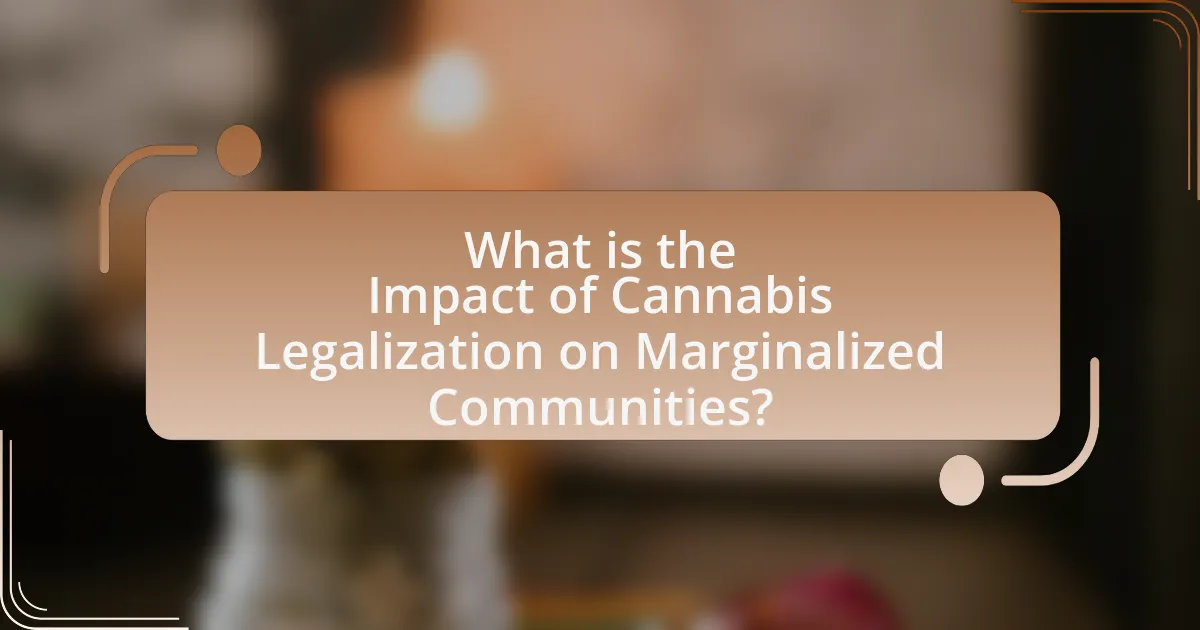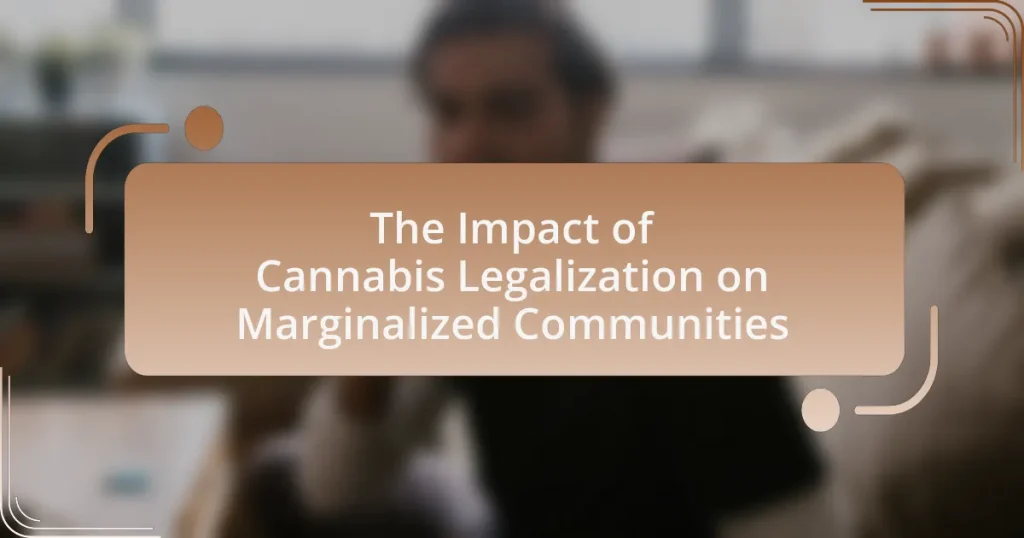The article examines the impact of cannabis legalization on marginalized communities, highlighting its effects on incarceration rates, economic opportunities, and social equity. It discusses how legalization has led to a decrease in arrests for cannabis-related offenses, particularly among Black and Latino populations, while also creating job opportunities within the burgeoning cannabis industry. The article further explores the historical context of cannabis prohibition, the ongoing barriers faced by these communities in accessing the legal market, and the health implications of legalization. Additionally, it emphasizes the importance of implementing equitable policies and community engagement to ensure that marginalized groups fully benefit from the changes brought about by legalization.

What is the Impact of Cannabis Legalization on Marginalized Communities?
Cannabis legalization has a significant impact on marginalized communities, primarily by reducing incarceration rates and generating economic opportunities. Studies indicate that in states where cannabis has been legalized, there has been a notable decrease in arrests for cannabis-related offenses, particularly among Black and Latino populations, who historically faced disproportionate enforcement. For example, a report from the American Civil Liberties Union (ACLU) found that Black individuals are 3.64 times more likely to be arrested for cannabis possession than white individuals, highlighting systemic racial disparities in enforcement.
Moreover, legalization creates avenues for economic empowerment through job creation in the cannabis industry, which can benefit marginalized communities. According to a report by the Marijuana Policy Project, states that have legalized cannabis have seen significant tax revenue, which can be reinvested into community programs, education, and health services. This economic uplift can help address historical inequities faced by these communities.
However, it is crucial to note that the benefits of legalization are not uniformly distributed; without intentional policies to ensure equity, marginalized communities may still face barriers to accessing the legal cannabis market. Therefore, while cannabis legalization presents opportunities for positive change, it also necessitates careful consideration of equity measures to ensure that marginalized communities fully benefit from these changes.
How does cannabis legalization affect social equity in marginalized communities?
Cannabis legalization positively affects social equity in marginalized communities by providing economic opportunities and reducing criminal justice disparities. Legalization creates pathways for entrepreneurship, allowing individuals from these communities to participate in the cannabis industry, which is projected to reach $41.5 billion by 2025 according to Grand View Research. Furthermore, it addresses the disproportionate impact of drug enforcement on marginalized populations; for instance, a 2020 report from the American Civil Liberties Union found that Black individuals are 3.64 times more likely to be arrested for cannabis possession than white individuals, highlighting the need for reform. By legalizing cannabis, states can implement social equity programs that prioritize licenses for those adversely affected by past drug policies, thereby fostering inclusivity and economic growth in these communities.
What are the historical contexts of cannabis prohibition in these communities?
Cannabis prohibition in marginalized communities has historical roots in systemic racism and socio-political agendas. In the early 20th century, particularly during the 1930s, the U.S. government associated cannabis with Mexican immigrants and African American communities, leading to stigmatization and criminalization. The Marihuana Tax Act of 1937 effectively banned cannabis, fueled by propaganda that portrayed its use as a threat to societal order, particularly in communities of color. This was further exacerbated by the War on Drugs initiated in the 1980s, which disproportionately targeted Black and Latino populations, resulting in mass incarceration and social disenfranchisement. Statistics show that despite similar usage rates, Black individuals were nearly four times more likely to be arrested for cannabis-related offenses than their white counterparts, highlighting the racial disparities entrenched in cannabis prohibition.
How does legalization change the narrative around cannabis use in marginalized populations?
Legalization changes the narrative around cannabis use in marginalized populations by shifting perceptions from criminality to acceptance and normalization. This transition allows for greater social equity, as marginalized communities, historically targeted by punitive drug laws, can now engage in legal cannabis markets, reducing stigma and promoting economic opportunities. For instance, states like California and Colorado have implemented social equity programs aimed at supporting individuals from communities disproportionately affected by past cannabis prohibition, thereby fostering inclusion and addressing historical injustices.
What economic opportunities arise from cannabis legalization for marginalized communities?
Cannabis legalization creates significant economic opportunities for marginalized communities by enabling access to new markets and job creation. Legalization allows these communities to participate in the cannabis industry, which is projected to reach $41.5 billion in the U.S. by 2025, according to a report by New Frontier Data. This participation can lead to entrepreneurship opportunities, as individuals can start their own cannabis-related businesses, from cultivation to retail. Additionally, legalization often includes provisions for social equity programs that provide funding and resources to support minority-owned businesses in the cannabis sector. For instance, states like California have implemented programs that allocate a portion of cannabis tax revenue to support small businesses in underserved communities. These initiatives not only foster economic growth but also help to rectify historical injustices related to cannabis prohibition.
How can cannabis businesses contribute to local economies?
Cannabis businesses can significantly contribute to local economies by generating tax revenue, creating jobs, and stimulating local commerce. For instance, in states where cannabis is legalized, tax revenues from cannabis sales have reached billions; Colorado reported over $1.7 billion in tax revenue from cannabis sales since legalization in 2014. Additionally, cannabis businesses create thousands of jobs in cultivation, retail, and ancillary services, which helps reduce unemployment rates in local communities. Furthermore, these businesses often source products and services locally, thereby supporting other local enterprises and enhancing overall economic activity.
What barriers do marginalized communities face in accessing these economic opportunities?
Marginalized communities face significant barriers in accessing economic opportunities related to cannabis legalization, primarily due to systemic inequalities, lack of capital, and regulatory challenges. Systemic inequalities manifest in limited access to financial resources, which hinders the ability of individuals from these communities to invest in cannabis businesses. For instance, a report by the Brookings Institution highlights that Black entrepreneurs are less likely to secure funding compared to their white counterparts, with only 1% of venture capital going to Black-owned businesses. Additionally, regulatory challenges, such as complex licensing processes and high application fees, disproportionately affect marginalized groups, making it difficult for them to enter the cannabis market. These barriers collectively restrict the economic benefits that cannabis legalization could provide to marginalized communities.
What are the health implications of cannabis legalization for marginalized communities?
Cannabis legalization has significant health implications for marginalized communities, primarily through increased access to medical cannabis and potential reductions in criminal justice involvement. Research indicates that access to legal cannabis can improve health outcomes by providing safer alternatives for pain management and mental health treatment, particularly in communities disproportionately affected by opioid addiction. For instance, a study published in the Journal of Health Economics found that states with legal medical cannabis saw a 25% reduction in opioid overdose deaths, highlighting the potential for cannabis to serve as a harm reduction strategy. Additionally, legalization can alleviate the stigma associated with cannabis use, encouraging individuals in marginalized communities to seek medical help without fear of legal repercussions. However, disparities in access to cannabis dispensaries and healthcare services may persist, necessitating targeted policies to ensure equitable health benefits.
How does access to legal cannabis affect health outcomes in these populations?
Access to legal cannabis positively affects health outcomes in marginalized populations by providing safer alternatives for pain management and reducing the risks associated with illicit drug use. Studies indicate that legal access leads to decreased opioid prescriptions and lower rates of opioid-related overdoses, as evidenced by a 2019 study published in the Journal of the American Medical Association, which found that states with legal cannabis saw a 25% reduction in opioid overdose deaths. Furthermore, legal cannabis access has been linked to improved mental health outcomes, as individuals report reduced anxiety and depression symptoms when using cannabis for therapeutic purposes. This is supported by research from the University of California, which highlights the therapeutic benefits of cannabis in treating PTSD and other mental health disorders prevalent in marginalized communities.
What role does cannabis play in addressing mental health issues in marginalized communities?
Cannabis plays a significant role in addressing mental health issues in marginalized communities by providing alternative therapeutic options for conditions such as anxiety, depression, and PTSD. Research indicates that cannabis can alleviate symptoms associated with these mental health disorders, offering relief where traditional treatments may be less accessible or effective. For instance, a study published in the Journal of Affective Disorders found that individuals in marginalized communities reported improved mental health outcomes after using cannabis, highlighting its potential as a viable treatment option. Additionally, the legalization of cannabis has been linked to increased access to mental health resources and reduced stigma, further supporting its role in enhancing mental well-being in these communities.
How does cannabis legalization influence criminal justice reform for marginalized communities?
Cannabis legalization significantly influences criminal justice reform for marginalized communities by reducing arrests and convictions related to cannabis offenses. In states where cannabis has been legalized, studies show a marked decrease in the number of arrests for possession, particularly among Black and Latino individuals, who historically faced disproportionate enforcement of cannabis laws. For instance, a report from the American Civil Liberties Union (ACLU) indicated that Black individuals are 3.64 times more likely to be arrested for cannabis possession than white individuals, despite similar usage rates. Legalization not only alleviates the burden of criminal records for many individuals but also reallocates law enforcement resources towards addressing more serious crimes, thereby promoting equity in the justice system. Furthermore, the revenue generated from legalized cannabis can be directed towards community programs and initiatives that support marginalized populations, further enhancing the positive impact of reform.
What changes occur in arrest rates and incarceration related to cannabis offenses?
Arrest rates and incarceration related to cannabis offenses have significantly decreased in jurisdictions that have legalized cannabis. For example, a study by the American Civil Liberties Union (ACLU) found that states with legalized cannabis saw a 50% reduction in cannabis-related arrests from 2010 to 2018. Additionally, incarceration rates for cannabis offenses have dropped, with the U.S. Sentencing Commission reporting a 20% decline in federal cannabis-related sentences following legalization measures. These changes indicate a shift in law enforcement priorities and a reduction in the criminalization of cannabis use, particularly benefiting marginalized communities disproportionately affected by previous cannabis laws.
How does legalization impact community-police relations in marginalized areas?
Legalization of cannabis positively impacts community-police relations in marginalized areas by reducing the frequency of arrests for low-level drug offenses, which historically have strained these relationships. For instance, a study by the American Civil Liberties Union found that in states where cannabis was legalized, there was a significant decrease in racial disparities in drug-related arrests, fostering trust between law enforcement and community members. This shift allows police to focus on more serious crimes, enhancing public safety and community engagement.
What challenges remain for marginalized communities post-legalization?
Marginalized communities face significant challenges post-legalization, including ongoing disparities in access to the legal cannabis market, economic opportunities, and social equity. Despite legalization, many individuals from these communities continue to encounter barriers such as high licensing fees, complex regulatory requirements, and limited access to capital, which hinder their ability to participate in the cannabis industry. For instance, a report by the Brookings Institution highlights that Black and Latino entrepreneurs are disproportionately affected by these barriers, resulting in a lack of representation in cannabis businesses. Additionally, the stigma associated with past criminalization persists, affecting employment opportunities and community relations. These challenges underscore the need for targeted policies to ensure equitable access and support for marginalized communities in the post-legalization landscape.
How do systemic inequalities persist despite cannabis legalization?
Systemic inequalities persist despite cannabis legalization due to ongoing disparities in access to the legal cannabis market, enforcement practices, and socio-economic barriers. For instance, marginalized communities often face challenges in obtaining licenses to operate cannabis businesses, as the application processes can be costly and complex, disproportionately affecting those with limited financial resources. Additionally, studies indicate that law enforcement continues to target communities of color for cannabis-related offenses, even in legalized states, perpetuating cycles of criminalization and economic disadvantage. According to a report by the American Civil Liberties Union, Black individuals are still more likely to be arrested for cannabis-related offenses compared to their white counterparts, highlighting the persistence of racial disparities in enforcement. These factors contribute to the continuation of systemic inequalities, undermining the intended benefits of legalization for marginalized communities.
What strategies can marginalized communities employ to overcome these challenges?
Marginalized communities can employ advocacy, education, and coalition-building strategies to overcome challenges posed by cannabis legalization. Advocacy efforts can focus on influencing policy to ensure equitable access to cannabis-related economic opportunities, as seen in states like California, where community organizations have successfully lobbied for social equity programs. Education initiatives can empower individuals with knowledge about their rights and the legal landscape, which is crucial for navigating the complexities of cannabis laws. Coalition-building among various marginalized groups can amplify voices and create a united front to address systemic barriers, as demonstrated by the collaborative efforts of organizations like the Minority Cannabis Business Association, which promotes diversity in the cannabis industry. These strategies collectively enhance the capacity of marginalized communities to navigate and benefit from the evolving cannabis landscape.
What best practices can be implemented to ensure equitable cannabis legalization outcomes?
To ensure equitable cannabis legalization outcomes, jurisdictions should implement community engagement, social equity programs, and restorative justice initiatives. Community engagement involves actively involving marginalized communities in the decision-making process, ensuring their voices are heard and their needs are addressed. Social equity programs can provide financial assistance, training, and resources to individuals from communities disproportionately affected by past cannabis prohibition, promoting their participation in the legal cannabis market. Restorative justice initiatives focus on expunging criminal records for individuals previously convicted of cannabis-related offenses, thereby removing barriers to employment and housing. These practices are supported by studies indicating that inclusive policies lead to better economic and social outcomes for marginalized groups, as seen in states like California and Illinois, which have incorporated social equity measures into their legalization frameworks.
How can community engagement shape cannabis policy in marginalized areas?
Community engagement can significantly shape cannabis policy in marginalized areas by ensuring that the voices and needs of local residents are prioritized in the decision-making process. Engaging community members allows policymakers to understand the specific challenges and concerns related to cannabis legalization, such as public health, economic opportunities, and social equity. For instance, research from the Drug Policy Alliance highlights that inclusive community dialogues can lead to policies that address historical injustices and promote equitable access to the cannabis market. Furthermore, data from the American Civil Liberties Union indicates that community-led initiatives can effectively reduce disparities in enforcement and access, fostering a more just regulatory framework.
What role do advocacy groups play in supporting marginalized communities during legalization?
Advocacy groups play a crucial role in supporting marginalized communities during legalization by providing education, resources, and representation. These organizations often work to ensure that the voices of marginalized individuals are heard in policy discussions, helping to shape legislation that addresses their specific needs and concerns. For example, advocacy groups have been instrumental in pushing for social equity provisions in cannabis laws, which aim to rectify the injustices faced by communities disproportionately affected by past drug policies. Research indicates that states with strong advocacy group involvement have implemented more comprehensive measures to support these communities, such as prioritizing licenses for individuals from impacted areas and allocating tax revenue to community reinvestment programs.


